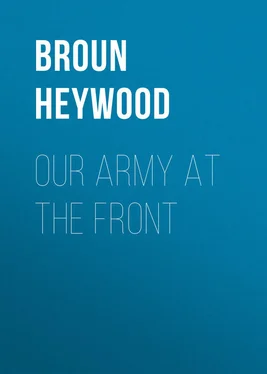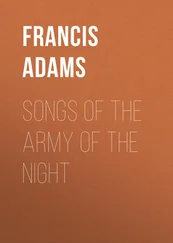Heywood Broun - Our Army at the Front
Здесь есть возможность читать онлайн «Heywood Broun - Our Army at the Front» — ознакомительный отрывок электронной книги совершенно бесплатно, а после прочтения отрывка купить полную версию. В некоторых случаях можно слушать аудио, скачать через торрент в формате fb2 и присутствует краткое содержание. Жанр: foreign_prose, foreign_antique, foreign_language, на английском языке. Описание произведения, (предисловие) а так же отзывы посетителей доступны на портале библиотеки ЛибКат.
- Название:Our Army at the Front
- Автор:
- Жанр:
- Год:неизвестен
- ISBN:нет данных
- Рейтинг книги:5 / 5. Голосов: 1
-
Избранное:Добавить в избранное
- Отзывы:
-
Ваша оценка:
- 100
- 1
- 2
- 3
- 4
- 5
Our Army at the Front: краткое содержание, описание и аннотация
Предлагаем к чтению аннотацию, описание, краткое содержание или предисловие (зависит от того, что написал сам автор книги «Our Army at the Front»). Если вы не нашли необходимую информацию о книге — напишите в комментариях, мы постараемся отыскать её.
Our Army at the Front — читать онлайн ознакомительный отрывок
Ниже представлен текст книги, разбитый по страницам. Система сохранения места последней прочитанной страницы, позволяет с удобством читать онлайн бесплатно книгу «Our Army at the Front», без необходимости каждый раз заново искать на чём Вы остановились. Поставьте закладку, и сможете в любой момент перейти на страницу, на которой закончили чтение.
Интервал:
Закладка:
An officer came along and broke up a crap-game. The soldiers forgave him, but the civilians did not. It was their first go at the game, and they wanted a lot of teaching.
The lone bookstore of the town made the only known effort to get the Americans what they asked for, instead of trying to prevail on them to adopt something French. They sent, perhaps to Paris, to get English books, and they piled their windows high with Macaulay's "History of England" and Bacon's "Essays."
The paper-buying habit is ingrown in the American male. He has three newspapers under his arm before any afternoon is what it should be. And so the soldiers bought the French papers, two and three at a time, and carried them around.
Any time of day or night, a look out into the town's main street descried a company or two of soldiers, on their way from camp for town-leave, or on their way back. They marched continually. The motor-cycle with the side-seat, which was later to be the distinguishing mark of the American Army in Paris, made its appearance in the seaport within a day or two of the first transport's landing, and eased the burdens of the French motor-lorries with which the American supplies had been taken to camp, owing to a delay of the First Division's own lorries, on a slow ship.
And most successful sensation of all, the army mule. The French knew him slightly, because their own army used him on occasion. But no Frenchman could speak to a mule in his own language as these big mule-tenders did.
It was exalting to watch the army on the march, to see the marines and the profusion of slim sailors. But the real crowd always gathered around the big negro stevedores in long navy-blue coats, scarlet-lined, with brass buttons all the way up the front, over and down the back – likely a thrifty hand-me-down from pre-khaki days – who marched with perfect knowledge of their magnificence.
The stevedores, for their part, were as amazed as the French, though on a different score. They accepted with due resignation the fact that the French spoke French. It was when they first saw a Senegalese in French uniform, triple-black with tropic suns, but to them a mere one of themselves, and when they hailed him gladly in their English tongue, to ask which road to take, that his indecipherable French answer broke them, heart and spirit alike.
"Dat one blame stuck-up nigger," said the spokesman, as they trudged their way onward, none the wiser if the Senegalese, in his turn, had been rebuking them in French for showing off their English.
So, in its several aspects, the First Division made its impact upon France, jostled itself a little and the French more, and finally settled down to its short wait at the coast before going inland, "within sound of the guns," to get its training.
And because the camps were to be used many times again by other divisions to come on the "bridge of ships," the first had to put in some extra licks to make their camp conveniences permanent.
They played a few baseball-games, and they were encouraged to do a lot of swimming, in the off afternoon hours. After a bit town-leave was heavily curtailed, but there was a dispensation now and then for a "movie." In the main they kept their noses to the grindstone.
After a little while the men who were to march in Paris on the Fourth of July were selected, and, preceded by a few sailors with fewer duties and longer indulgences, they entrained on the late afternoon of July 2. There was no measuring the disappointment of the ones who were left behind, for the prediction that there would be doings in Paris on the first French Fourth of July was to be fulfilled to the letter.
But the housekeepers of the army could not be spared for celebrations. As soon as the marines could be despatched from the seaport they were sent direct across France to the points behind the lines where their training-camps were in waiting, and there, within a few weeks, the First Division reassembled and fell to work.
Meanwhile, of the doings in Paris —
CHAPTER IV
THE FOURTH OF JULY
THE first they knew of it in Paris – barring vague promises of "something to remember" on the American fête that had appeared in modest items in the newspapers – was when a motor-bus, jammed to the guards with American soldiers, suddenly rolled into the Avenue de l'Opéra from the Tuileries Gardens, and paraded up that august thoroughfare to the tune of incredible yelling from everybody on board. It was the afternoon of July 3.
A few picked Americans had known about it. A sufficient number of American and French officers and the newspaper correspondents had been told to appear at Austerlitz Station in the early morning of the 3d, and there they had seen the soldiers not merely arrive but tackle their first continental breakfast.
Neither was a sensation to be sneezed at. The soldiers were of the very finest, and in spite of their overnight journey they were all looking fit. They were anxious to fall right out of the train into the middle of Paris. To most of them it was a city of gallant and delightful scandal, filled even in war-time with that twinkle of gayety plus wickedness that is so intriguing when told about in Oscaloosa, behind the hand or the door. They said outright that they expected to see the post-cards all come to life when they set eyes first on Paris streets.
But even if Paris had had these fascinations in store, they were not for the soldiers that morning. Instead military precision, discipline, an orderly march to near-by barracks, and – a French breakfast: coffee and war-bread. Not even the French had a kind word for the war-bread, and no American ever spoke well of the coffee. But there it was – chronologically in order, and haply the worst of a Paris visit all over at once.
And most of the soldiers stayed right in barracks till it was time for the great processional the next day. It was a picked bunch that had the motor ride and informed Paris that they had come for a party. And if they didn't see the ladies with the unbehaving eyes, they did see the Louvre and the Tuileries, the Opéra, the boulevards, and the Madeleine. And Paris saw the soldiers.
There was no end of cheering and handclapping. The American flags that had been flying for Pershing were brought out again, and venders appeared on the streets with all manner of emblems to sell. It was one of those cheerful afternoons when good feeling expresses itself gently, reserving its hurrahs for the coming event.
The soldiers were kept on the cars, but now and then a good Parisian threw them a package of cigarettes or a flower. All told, they touched off the fuse timed to explode on the morrow, and, having done that, went back to barracks.
The first "Fourth" in Paris was a thoroughly whole-souled celebration. The French began it, civilians and soldiers, by taking a band around to serenade General Pershing the first thing in the morning. His house was on the left bank of the Seine, not far from American headquarters in the Rue Constantine, an historic old place with little stone balconies outside the upper windows.
On one of these General Pershing appeared, with the first notes of the band. He was cheered and cheered again. A little boy who had somehow climbed to the top of a gas street-lamp squealed boastfully to Pershing: "See, I am an American, too, for I have a sky-scraper!" (J'ai un gratte-ciel!) And with a wave of his hand General Pershing acknowledged his compatriot.
It was in this crowd around Pershing's house that a riot started, because a man who was being unpleasantly jostled said: "Oh, do leave me in peace." Those nearest him good-naturedly tried to give him elbow-room, but those a little distance away caught merely the "peace" of his ejaculation and, with sudden loud cries of "kill the pacifist," made for the unfortunate, and pommelled him roundly before the matter could be explained.
Читать дальшеИнтервал:
Закладка:
Похожие книги на «Our Army at the Front»
Представляем Вашему вниманию похожие книги на «Our Army at the Front» списком для выбора. Мы отобрали схожую по названию и смыслу литературу в надежде предоставить читателям больше вариантов отыскать новые, интересные, ещё непрочитанные произведения.
Обсуждение, отзывы о книге «Our Army at the Front» и просто собственные мнения читателей. Оставьте ваши комментарии, напишите, что Вы думаете о произведении, его смысле или главных героях. Укажите что конкретно понравилось, а что нет, и почему Вы так считаете.












